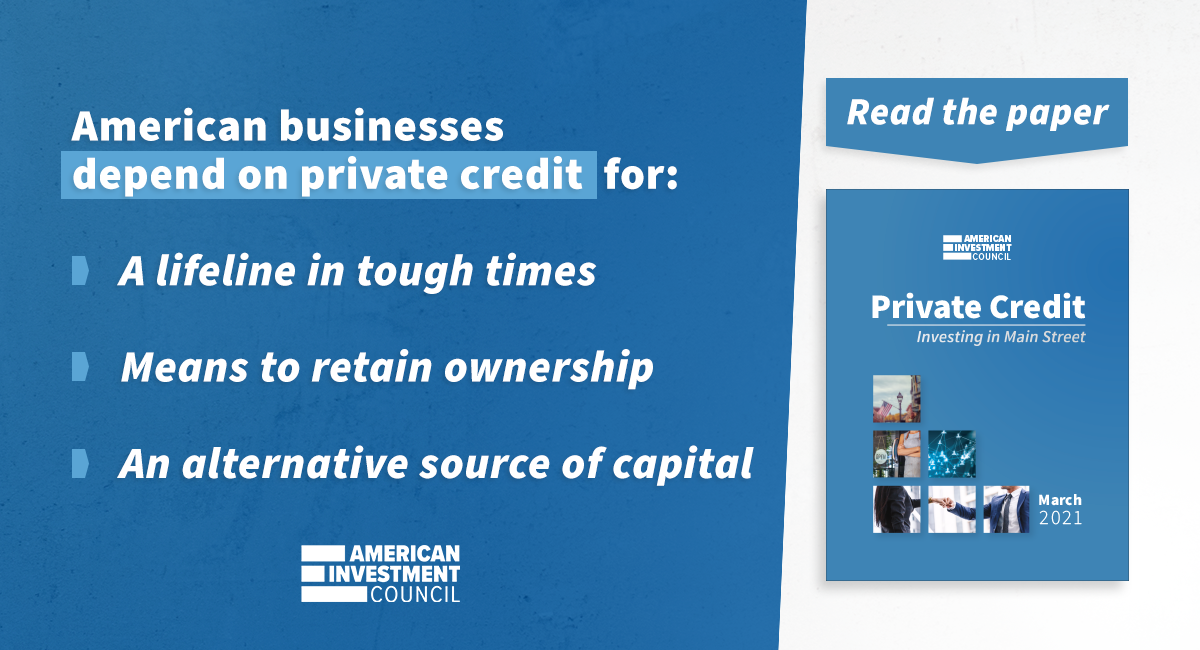New Report: Private Credit Provides Businesses with Critical Capital
Washington, D.C. – Today, the American Investment Council released a new report examining how private credit has become a critical source of capital for businesses looking to expand and hire new…

Washington, D.C. – Today, the American Investment Council released a new report examining how private credit has become a critical source of capital for businesses looking to expand and hire new workers. Over the last 30 years, banks and other traditional lenders have scaled back lending to businesses because of structural and regulatory changes dis-incentivizing them to lend. Capital is critical for companies to grow, and private credit has stepped up to partner with businesses to fill this void in a way that is structurally safe for the broader economy. Private credit vehicles have grown from holding just $25 billion in 1999, to more than $800 billion in 2019.[1]
“Private credit has emerged as a much-needed source of long-term investment for small- and mid-sized businesses during the COVID-19 crisis that don’t have access to debt or equity markets,” said AIC President and CEO Drew Maloney. “The AIC’s latest report shows that private credit is just one more way that private equity builds businesses, creates jobs, and generates superior returns for teachers, firefighters and other public servants.”
The AIC’s latest report entitled, Private Credit: Investing in Main Street, found that small- and mid-sized American businesses have increasingly depended on private credit for support, including as:
- Lifeline in Tough Times: Private credit is often a lifeline of last resort to businesses that need capital to stay afloat, which helps stabilize the economy by supporting companies that would otherwise go bankrupt or close their doors. Recently, private credit has been a critical source of support for businesses struggling during the COVID-19 economic downturn.
- Means to Retain Ownership: Many businesses make the choice to partner with private credit rather than issue stock because it allows them to retain ownership. This allows entrepreneurs the freedom to plan for long-term growth instead of answering to shareholders or quarterly earnings pressure.
- Alternative Source of Capital: Many smaller or mid-size businesses don’t have access to typical equity markets. As a result, private credit and debt markets are often the only source of capital available to entrepreneurs and business owners looking to expand and create new jobs.
Private credit has also emerged as an important tool to help investors achieve:
- Diversification: Private credit has proven more resilient during periods of economic downturn. A recent survey[2] by Preqin found that 65 percent of investors are drawn to private credit because it is the asset class least correlated to public equity. This stability is due to private credit requiring investors to commit to lock-up periods as long as eight years.
- Superior Returns: Research by Hamilton Lane[3] shows that private credit outperformed public credit by a superior margin in the years following the Great Recession. These returns help support the retirements of public servants, including firefighters and schoolteachers.
Click here to read the full report published by the American Investment Council.
Click here to read more about how private equity is partnering with businesses to provide capital and industry expertise during the COVID-19 pandemic.
[1] The Beast in the Jungle, Hamilton Lane Market Overview 2019-2020, Hamilton Lane
[2] 2020 Preqin Global Private Debt Report.” Pp. 54.
[3] The Beast in the Jungle, Hamilton Lane Market Overview 2019-2020, Hamilton Lane.


